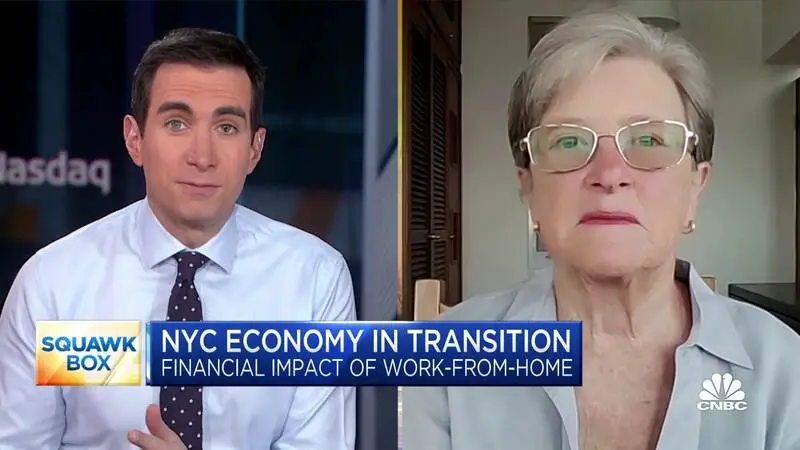
Full-time office work is 'dead': 3 labor experts weigh in on the future of remote work
The pandemic-era trend of working from home remains a key feature of the U.S. job market — and is likely to stay entrenched as a permanent perk for a broad swath of the American workforce, according to labor economists.
The pre-pandemic baseline of going into an office five days a week "is dead" for many workers, said Nick Bunker, an economist at job site Indeed.
"Remote work is here to stay," Bunker said.
More from Personal Finance:
Missing tax forms will 'definitely' delay your refund
When will Supreme Court rule on Biden's student loan forgiveness plan?
Average recipient to get $90 less in food stamps as Covid aid ends
Workers and companies see benefits of remote work
In 2019, about 5% of full-time work was done from home. The share ballooned to more than 60% in April and May 2020, in the early days of the Covid-19 pandemic, said Nicholas Bloom, an economist at Stanford University who has researched remote work for two decades.
That's the equivalent to almost 40 years of pre-pandemic growth virtually overnight, his research shows.
The share of remote work has steadily declined (to about 27% today) but is likely to stabilize around 25% — a fivefold increase relative to 2019, Bloom said.
"That's huge," he said. "It's almost impossible to find anything in economics that changes at such speed, that goes up by 500%."

Initially, remote work was seen as a necessary measure to contain the spread of the virus. Technological advances — such as videoconferencing and high-speed internet — made the arrangement possible for many workers.
Both employees and companies subsequently discovered benefits beyond an immediate health impact, economists said.
Employees most enjoy the reduction in commute, less time getting ready for work and a flexible schedule that more easily allows for doctor visits and picking up kids from school, Bloom said.
Some workers have shown they're reluctant to relinquish those perks. Companies such as Amazon and Starbucks, for example, recently faced a backlash from employees after announcing stricter return-to-office policies.
Employers enjoy higher employee retention and can recruit from a broader pool of applicants, said Julia Pollak, chief economist at ZipRecruiter. They can save money on office space, by recruiting from lower-cost areas of the country or by raising wages at a slower pace due to workers' perceived value of the work-at-home benefit, she said.
It's almost impossible to find anything in economics that changes at such speed.Nicholas Bloomeconomist at Stanford University
For example, job seekers polled by ZipRecruiter say they'd be prepared to take a 14% pay cut to work remotely, on average. The figure skews higher — to about 20% — for parents with young children.
Twitter recently shut its Seattle offices as a cost-cutting measure and told employees to work from home, a reversal from an earlier position that employees work at least 40 hours a week in the office.
"The benefits for employers are pretty substantial," Pollak said.
Hybrid work model is a 'win-win'
Most companies have turned to a "hybrid" model, with a work week split between maybe two days from home and three in the office, economists said.
That arrangement has yielded a slight boost in average worker productivity, Bloom said. For one, the average person saves 70 minutes a day commuting; roughly 30 minutes of that time savings is spent working more, he said.
"Hybrid is pretty much a win-win," Bloom said.
About 39% of new hires have jobs with a hybrid work arrangement, while 18% of new jobs are fully remote, according to ZipRecruiter. Both shares are up relative to their pre-pandemic levels (28% and 12%, respectively).
"It's still an evolving trend, but the movement is very much toward increased remote work," Pollak said.
Of course, not all workers have the option to work remotely. About 37% of jobs in the U.S. can plausibly be done entirely at home, according to a 2020 study by Jonathan Dingel and Brent Neiman, economists at the University of Chicago.
There are large variations by occupation and geography. For example, jobs in retail, transportation, hospitality and food services are far less likely than those in technology, finance, and professional and business services to offer work-from-home arrangements.
Remote work may endure even in a recession
Not everyone agrees that the benefits of working from home outweigh costs.
Evidence suggests employee mentoring, innovation and company culture may suffer if jobs are fully remote, Bloom said. Workers cite face-to-face collaboration, socializing and better work-life balance as top benefits of in-office work, his research finds.
Companies that are fully remote often have in-person gatherings or retreats as a way to build company culture, Bloom said.

Workers have enjoyed a high degree of bargaining power due to a hot labor market characterized by low unemployment and ample job openings. If the economy cools and their bargaining power dissipates, it's unclear whether some employers would introduce stricter work-from-home policies, economists said.
For one, employers may see remote work as a useful ways to trim labor costs in the face of recession, Bunker said. The more likely scenario is on the margin: perhaps three or four days in the office instead of one or two, he said.
The technology sector is a useful indicator, he said. Tech job postings have fallen this year amid industry struggles, but the share of Indeed job ads offering the remote work benefit has remained constant, Bunker said.
"It's been quite sticky in the face of hiring pullbacks," he said.
Source: https://www.cnbc.com/2023/03/03/the-future-of-remote-work-labor-experts-weigh-in.html






